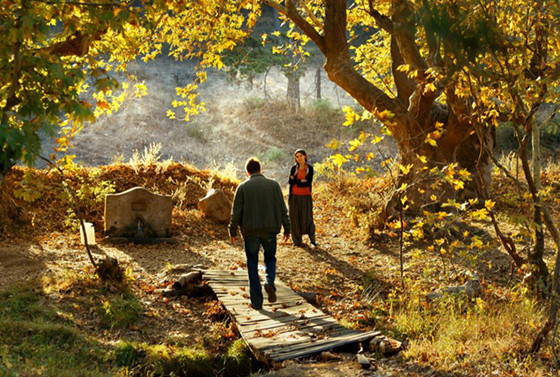Existentialism and cinema have always gone hand in hand. How do we create soul-searching cinematic films and aspire to true art while our lives can be viewed the same way? As humans, we simply have to find a purpose for meaning and to live our lives regardless of the absurdity, free will, and explanation behind the daily encounters in life or in our heads.
Sure, philosophies from Marcel to Schopenhauer to Heidegger to Kierkegaard can be explored, but the main question is from Sarte – of what it means to be a human being existing in the world. What are the reasons behind it?
In terms of existentialism, he stated, “Man must create his own essence: it is in throwing himself into the world, suffering there, struggling there, that he gradually defines himself. And the definition always remains open ended.” In tears of film, Stanley Kubrick expressed it best in terms of technical or soul searching when he said, “However vast the darkness, we must supply our own light,” possibly linking to Sarte.
The cinematic art form has explored this question and most recently in this past decade, particular films focus on this theme in their works. Therefore, here are 10 great existentialist films of the 2010s.
10. Somewhere (2010) – The vastness of celebrity
Sofia Coppola is no stranger in exploring how people find a sense of purpose, and their search for meaning against the backdrop of a world. Here, she explores the relationship between a successful movie star played by Stephen Dorff who has to care for his 11-year-old daughter, Cleo, played by Elle Fanning, in Hollywood.
As the film’s controlled visual aesthetic allows audiences to search what’s in and out of the frame, Dorff’s Marco does the same in his life. As he is holed up in the Chateau Marmont, he tries to find meaning in his life amidst the celebrities, models, strippers, Ferraris, and all the high life Los Angeles has to offer, but nothing seems to click for him.
It’s not until the final images do we see whether or not Dorff is successful, but how the camera follows him and his daughter with minimum activity. We, as the audience, must figure out what he is truly thinking. Why doesn’t he make a change? Why isn’t he asking bigger questions? Why doesn’t he leave Hollywood? Many of these detailed questions can be applied to Coppola’s filmography in different patterns and specifics, but maybe just from the title, we can derive what Marco is thinking about while he is in a limbo state.
9. A Pigeon Sat on a Branch Reflecting on Existence – What are we actually doing?
Closing out his “Living” trilogy with a bang, Roy Andersson continues his drab, grey, darkly comedic tableaux about what it means to be a human being. Sure, these episodes ranging from love-makers on a beach overshadowed by a massive dog, a heartache in a cafeteria discussing who gets the food, and a monkey being experimented on don’t attach us to a protagonist, but a collective of stories that makes us think about who we are, what we want, and what will become of us.
As the film unfolds, numerous questions as previously stated arise from the circumstances and that we are the pigeons in this case, reflecting on the characters. We are curious what they will do and, essentially given the dramatic or mundane scenes, they take action. And in this film, their actions essentially give them meaning and reveal, like in the best sense of filmmaking, who they truly are.
A film by Andersson is immediately identifiable due to framing, color, and design, but without the humanity, it is essentially blank, void, and empty. Maybe that is why this conclusion to his film trilogy works so well – the characters must take action and find a purpose in this drab, grey world. It’s only then that they can find purpose and move on to the next story.
8. Under the Skin (2014) – What it means to be a human being?
Quickly into Jonathan Glazer’s hypnotic and genre bending film do we realize that we must establish, analyze, and follow all that happens to these creatures, predominantly played Scarlett Johansson as an alien in search of a human body.
As the film unfolds in a haunting Kubrickian science fiction documentary in cinematic style, and fever dream, Johansson’s unnamed character learns about the human condition from the human beings she seduces and ultimately collects for her establishment.
From the entrapment of the fly, letting a deformed man free, and ultimately betraying her mission, she learns what humans do and how they function emotionally. Therefore, we have an alien finding a purpose by mirroring and learning from her fellow humans. Of course, things aren’t that easy when you’re essentially being hunted, witness a tragedy at the beach, and encounter animalistic men due to beauty along the way.
But in the end, Glazer invites and really hypnotizes us to show what human beings can do. And in flux, Johansson’s character must find a purpose in her quest and search for meaning or she will face eventual demise. It’s only until the film’s final scenes that we learn the hard truth about our nature.
7. Burning (2018) – The confusion of it all
Possibly the most staggering, brutal and beautiful film that explores the ennui and confusion of being a young adult in the modern world. Lee Chang-dong’s return to cinema is nothing short of his previous brilliance of characters figuring out what to do in the midst of a troubling situation.
In the film, when Shin returns aboard from Nairobi with a Gatsby-like Ben, her friend, and kind of boyfriend Lee, doesn’t know what to make of the scene. As the film progresses and delves into a character-focused mystery amongst the urban and rural Korean landscape, we start to think about what is truly behind these characters. They are thrust into a situation, particularly Lee, and he obsessives over the outcome and what actually occurred when he wasn’t around. It becomes his main priority.
Sure, it can be labeled a psychological thriller, but his main focus in life is when Shin pops back into his void-filled life and when Ben is introduced into his. He didn’t have a purpose beforehand and he follows his obsessions, curiosity, and doubts no matter how dark or dangerous they may be.
In the end, his confusion and malaise of his youth take over because he has no purpose. Someone and something enters his life and he is sucked up into it with devastating results, proving he threw himself into the world without knowing the consequences or obtaining real answers, but discovering himself along the way.
6. Anomalisa (2015) – Purpose of individuality
It might seem strange at first how a stop-motion animated film can capture how one man struggles with the day-to-day existence, but coming from the mind of Charlie Kaufman and co-director Duke Johnson, it makes complete sense. Adapting his audio play, written under Francis Fregoli, he explores many existentialist themes from the point of our main character, voiced by David Thewlis.
Taking course over a business weekend at the Fregoli Hotel in Cincinnati, Thewlis’s Michael Stone enters a Kafkaesque world where everybody looks and sounds the same (a la the Fregoli delusion). Immediately we sense Stone is searching for bigger answers in his mundane, run-of-the-mill work line while consisting of being a father and husband, but he is simply off.
Almost every encounter sounds and feels the same, adding to no real or new experiences; it’s all a blur to him until he meets a woman, voiced by Jennifer Jason Leigh, who sounds and looks different. Does he sense a new awakening? Thewlis’ Stone represents many middle-aged men and women performing routine tasks with no real purpose or intuition. Through Kaufman’s brilliant labyrinth and anomalies, he may have found a sense of purpose in this world through another human being.
Out of this experience, Stone can reawaken to his true life that he believes he has found, or learn from it and return home to his mundane existence. He simply must find his purpose as he awakens from his daydream.
5. The Great Beauty (2013) – The emptiness of the party
Exploring the high life of Roman society in the modern age through an aging man past his prime might sound a bit somber. However, Paolo Sorrentino’s sort of updated riff on Fellini’s “La Dolce Vita” elevates this position due to the questioning of art, life, and death in exuberant, musical, operatic fashion.
As we dive into the party, Toni Servillo’s Jep turns and looks directly into the camera saddened and empty while his guests dance the night away. It is here that we truly see the first real skin and feeling of a character, not pretending anymore. As the film drifts from the party to women to wandering around, Jep finally decides he can only do what he wants to do in life after his 65th birthday party.
Of course, it’s a glamorous and cinematic portrayal, but underneath the high life, parties, fashion, and riches, it’s nothing but empty decadence and a life wasted as he slowly comes to learn. With numerous one-liners and quotes – particularly, Jep essentially preaching to himself – he realizes the true nature of this man and his eternal search for the great beauty.
4. The Wild Pear Tree (2018) – Pursuit of art or family?
In Nuri Bilge Ceylan’s three-hour-plus film, nothing much happens, but almost everything happens at the same time to our protagonist, Sinan. How does this happen because we essentially follow Sinan’s wandering and conversation from people new and old in his life, and what he will do after graduation. While he struggles with his father’s gambling addiction destroying the family, nothing major occurs.
From conversations with a past possible love interest to friends of faith, to a local author in which he finally discovers Sinan wants to write with his life, the episodes take a toll psychologically and mentally on Sinan in beautiful photography with Bach accompanying those images. But it’s truly about the search for one man’s purpose – whether being art or his family.
When he speaks with a local author that leads to an angry yet comical ending, he asks if a writer can write even if he pushes aside his family and friends. He doesn’t know whether to follow his artistic dream or settle for a domestic life that clearly doesn’t sit well with him.
None of the conversations are light in the film, but when it comes to the final scene between father and son, we get a sense of Sinan’s purpose for being at that place. In this given time in his life we understand and begin to comprehend everything he has been through and what has been stated in the film. Ceylan’s masterful approach of observance, realism, and dramatic tension linger in the mind long afterwards much like Sinan’s thoughts on his art and family life.
3. The Tree of Life (2011) – Aspect of nature and grace
Most likely the magnum opus of Terrence Malick’s career as he explores life, death, and the beyond in this masterpiece. At one point, Jessica Chastain’s Mrs. O’Brien states that life must be lived through nature or grace, stating love or the beyond.
As we are hypnotized from 1950s Oklahoma to dinosaurs to intergalactic space exploration, past and future, we realize the most important aspect is how these characters go about their lives. They are extremely fixated on how to live their lives and when unexpected tragedy occurs, all their values, beliefs, and faiths are thrown into turmoil, allowing an exploration of the past to take place. Where do these characters go from here after a life of faith, interwoven with nature and grace?
Many questions like, what is my purpose to my family? To God? To my brother? Father? Mother? Are explored and never actually answered in this film; much like the characters, they must decide how to handle this tragedy and childhood upbringing. Through Malick’s visual poetic form, we must ask the same questions too. And in response, come up with our own reason and interpretation of the film. Consequently, creating an existentialist film where the characters and audience must explore the same questions until the end of time.
2. Inside Llewyn Davis (2013) – Only to repeat?
There comes a point in the Coen brothers’ surreal, circular odyssey that we feel we’ve seen this before, and it’s all too familiar to the mesmerizing Oscar Issac as the title character. Despite simply following the life of a folk singer in pre-Bob Dylan Greenwich Village, we see Llewyn’s struggle not for a purpose, but his will to keep going despite the obstacles he faces.
When he visits his sister in Queens, she states that he should give up show business and Llewyn responds with, “What, quit? Just exist?” It can all boil down to show that Llewyn’s purpose in life is to play music and essentially make a living out of it, so if folk music doesn’t exist for him for a wide variety of strange encounters and idiosyncratic circumstances, what will he do? He tries, fails, and ponders over what he can. He already knows his light in life but it simply doesn’t shine back on him.
It’s extraordinarily difficult to find a purpose in life and not have that goal fulfilled, as we see in the film. However, despite a circular narrative when Llewyn is doomed to repeat failures, and even a foreshadowed warning from Carey Mulligan’s angry yet supportive Jean that the same things will keep happening to him, Llewyn simply just has to carry out fulfilling his purpose, even if the odds are against him.
1. Things to Come (2016) – Where to go for the final act?
In Mia Hansen Love’s sublime pairing with Isabelle Huppert, we see how a philosophy teacher re-examines her life after her husband leaves her. Through interweaving discussion of philosophy amongst students, caring for her ailing mother, or simply trying to survive day to day encounters, it’s a slice of life about a woman heading into her final act of life.
At one point in the film, Huppert’s Nathalie expresses her satisfaction about being fulfilled intellectually instead of having a plus one. She states it clearly and boldly, but she knows deep down that something must be fixed as well. There are dozens of moments similar to this and we see how Love is fascinated by following this woman whether laughing or crying, figuring out what she should do even if she doesn’t know or understand herself. It’s the simple existentialism we face everyday without even knowing it. It doesn’t have to be over the top or face a tremendous challenge, it can simply be about getting through the day.
Love has never shied away from exploring the life of a woman, but here she doesn’t linger on youth but rather the finding of youth as a woman enters her final act. It shows you should never shy away from the possibility of growth, life, and love.



Comments
Post a Comment